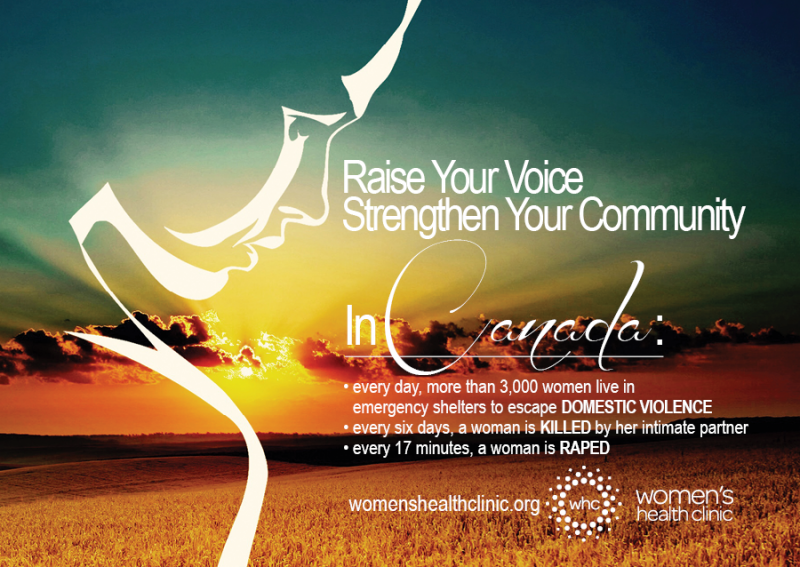Raise Your Voice – Strengthen Your Community
by Jennifer Davis Missing and murdered. It seems we’ve heard that term a lot lately. Too much. Women and men across Canada are trying to change that and trying to make a difference. We at Women’s Health Clinic also want to make a difference. To honour the women who have been murdered or abducted across Canada, we created a window display and postcard campaign with a plea for our Federal government to support a change for peace. (download PDF for postcard here) The Window Display I developed the window display after finding Dr. Maryanne Pearce’s database of missing and murdered women online. Over the course of seven years, she’s collected names from the public domain, meticulously recording them, and honouring women who have been murdered or have

by Jennifer Davis
Missing and murdered. It seems we’ve heard that term a lot lately. Too much.
Women and men across Canada are trying to change that and trying to make a difference. We at Women’s Health Clinic also want to make a difference.
To honour the women who have been murdered or abducted across Canada, we created a window display and postcard campaign with a plea for our Federal government to support a change for peace. (download PDF for postcard here)
The Window Display
I developed the window display after finding Dr. Maryanne Pearce’s database of missing and murdered women online. Over the course of seven years, she’s collected names from the public domain, meticulously recording them, and honouring women who have been murdered or have been declared missing in Canada since 1946.
The names of 4400 women are on this list. Imagine for a moment what a gathering of 4400 women would look like. Consider the strength of their number and what their contributions to our world could have been.
This list – which includes women from every ethnicity – covers most of one of the windows in the display. Over 300 women on the list are from Manitoba.
About the Database
Dr. Maryanne Pearce from Ottawa created the database as her doctorate in Laws dissertation. The names will be printed in her upcoming book An Awkward Silence: Missing and Missing and Murdered Aboriginal Women in Canada from University of Manitoba Press.
The database continues to grow at a disarming rate.
The list reached 4400 names in early December 2014.
Transgender Women
Our display also acknowledges the problem of missing and murdered transgender women.
Transgender people are at high risk for murder, but for many reasons, the stats don’t reflect this. Sadly, trans people are not yet fully
recognized in our society. The police will not automatically check for gender status when they find a body. Family members may not know or be in denial about the gender identity of their loved one.
The database shows only two Manitoba missing and murdered people as trans women – or possibly trans – despite the fact that we know there are more. The systems that prevent the visibility of trans people are at fault here, not the database.
In recognition of Canada’s and Manitoba’s transgender people, we acknowledge that many more have been missing or murdered
than are reported.
Healing and Hope
To bring balance to the pain of the issue of missing and murdered women in Canada,
our window display also offer a vision of heali ng and hope.
ng and hope.
Because many of the names are those of Aboriginal women, we’ve highlighted some Aboriginal traditions and teachings. Our display includes a large Medicine Wheel of fabric and Muskiiki – four sacred medicines: tobacco, sage, sweetgrass and cedar. Each plant has different qualities and is used in ceremony for specific reasons. We also display a Star Blanket (also called Star Quilt). Healing and traditional items have also been included from other traditions including a replica of an African drum, Tibetan prayer beads, and roses.
Without some aspect of healing and an idea of a more peaceful future, we may never find the way toward ending the tragedy of violence.
Postcard Campaign
Our postcard campaign is an important piece of this project. The text of the postcard includes a plea for Prime Minister Stephen Harper to heed the recommendations of hundreds of First Nations Canadians who have gathered together to find realistic and sustainable solutions to the tragedy that continues to unfold.
Many First Nations groups have held forums and inquiries into the issue over the decades and have made excellent recommendations; most notably and recently from the Native Women’s Association of Canada (NWAC). Our postcard text highlights recommendations from this list and pleads government to support the efforts to bring these recommendations to life.
Please contact Women’s Health Clinic for a postcard, or use this PDF to print your own.
SOURCE: Women’s Health Clinic – Read entire story here.









